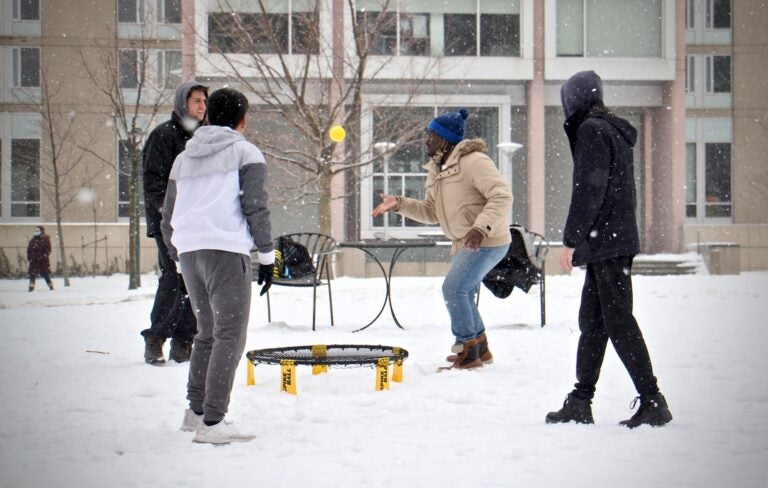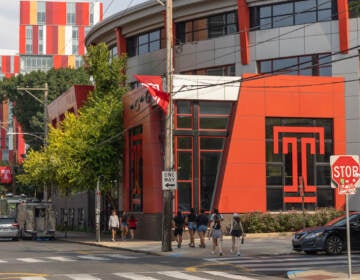When campus is not a bubble, how does a university enforce physical distancing rules?
Thousands of university students live in Philadelphia — off campus. Their pandemic parties and study sessions are not pleasing the neighbors.

University of Pennsylvania students play a game on a snowy quad. (Emma Lee/WHYY)
Ask us about COVID-19: What questions do you have about the coronavirus and vaccines?
For many Philadelphia universities, the start of 2021 marked some semblance of a return to normalcy, with Drexel University, Temple University, and the University of Pennsylvania each inviting thousands of students to live on campus for the spring term.
Yet in the eyes of many neighborhood residents and some students themselves, months of planning on behalf of the university administrations have not appeared to sufficiently take into account the health and well being of the surrounding residents, particularly given that communities of color — who largely represent the neighborhoods adjacent to the universities — are disproportionately affected by the virus.
“We can’t win,” North Philadelphia resident Ruth Birchett said. “We’re a vulnerable community and these young people coming from states all over the country are jeopardizing our health and safety.”
Birchett, who has lived near Temple her whole life and attended the school herself as an undergraduate, said she first found out about the North Philly school reopening campus in the fall from 6ABC, and not from the university itself.
“They can send an email asking for money as an alumni, but they don’t send out information to anybody here in the neighborhood, and then they pick what community leaders they want to talk to,” she said, detailing a longstanding divide between the university and the community. “And in the media, they only talked about on-campus [life]. There was never a focus on the impact of off-campus housing on our community. … And this is just another example of how the encroachment of Temple University on this African American residential community has jeopardized our safety.”
Universities lack jurisdiction over off-campus housing
Birchett is not alone in her specific concerns with how the actions of off-campus university students influence the surrounding communities.
Drexel, Penn, and Temple all have comprehensive testing policies ranging from weekly to twice weekly screening, as well as some form of compact or handbook mandating students physically distance, wear masks, and refrain from organizing or attending gatherings not in compliance with city guidelines. Yet residents and students alike have protested universities’ inability to enforce these guidelines to off-campus students, with universities claiming that doing so is beyond their jurisdiction. And with the city opting to ease some of its restrictions, such as allowing spectators at professional sporting events, and allowing more people at retail stores and restaurants, it is possible such changes could lead to more crowding around campus.
Philadelphia Department of Public Health spokesperson Matt Rankin said the city is relying on self-compliance when it comes to abiding by such public health guidelines, acknowledging that there is no exact way to hold people accountable. He added that he was not aware of recommendations on behalf of the city for universities to consult with community members before announcing their plan to open campus.
At Temple, university spokesperson Ray Betzner said that the school was in conversation with the North Philadelphia Special Services District, which comprises local residents and university representatives. The North Philadelphia Special Services District did not respond to a request for comment on their outreach strategy.
Betzner outlined a patrol area ranging from 18th Street to 9th Street, from Susquehanna Avenue to Jefferson Street, in which Temple officials are able to enforce its guidelines, and said that part of its Four Pillars policy includes redesigning classrooms and other spaces to ensure populations can safely and easily use them. For buildings Temple does not own, however, which are further interspersed into the residential community, he said the university is not able to make any adjustments to further enhance physical distancing measures.
Hafeezat Bishi, a senior at Temple, has observed situations ranging from students walking around campus without masks on, to students attending off-campus parties, and found there to be zero enforcement on behalf of the university.
“Because it’s not an on-campus situation, [the university] doesn’t have much jurisdiction as to what people do when they’re off-campus residents,” she said. “The most that they’re able to do is really just put out statements saying ‘We encourage people both on-campus and off campus to avoid gathering’ and stuff like that, but other than that I have seen little to no repercussions for what’s been going on.”
Bishi added that even law enforcement, which she was hesitant to call as a Black woman, but did as a last resort after observing an off-campus party, failed to break up the party and reprimand students.
“[The police officer] stood there, didn’t knock on any doors, didn’t announce herself or anything like that, and left, and that’s when I realized they don’t want to enforce anything,” she said. “I don’t want police involvement in a Black and brown community, but if there are no other resources to use, what can we do to ensure the safety of others as well as actually hold people accountable for their reckless actions?”
Betzner did not provide data for how many people have been disciplined and what the consequences entailed but emphasized that Temple has and will continue to enforce its policy. He added that the positivity rate continues to be under 1% — which is less than the citywide rate — and that through contact tracing, the city has not been able to identify any transmission between the Temple and community populations.
In West Philadelphia, universities, students, and residents are similarly situated.
At Penn, where the undergraduate positivity rate reached a staggering 4.47% before eventually dropping to under 1%, and at least two students have tested positive for the more contagious B.1.1.7 variant of the virus, the university did not respond to a request for comment regarding if it consulted the West Philadelphia community before reopening campus. Residents, however, told the university newspaper, The Daily Pennsylvanian, that they were blindsided by the decision.
City Councilmember Jamie Gauthier, who represents West Philadelphia, wrote in a statement that she was not aware of Drexel or Penn engaging in widespread community outreach when developing their reopening plans, though they were in touch with city government.
Penn did present plans at a regularly scheduled community stakeholders meeting, she said. West Philadelphia resident Arnett Woodall, who has partnered with Drexel and Penn students and faculty on improving public safety in the area, was one of many residents not in attendance at the meeting. He said he was not aware of any announcement from the university to the community.
Woodall called on universities to increase transparency and offer resources to the community.
He views a partnership between Philadelphia universities and communities as mutually beneficial, in which the ultimate goal is to enhance public safety for all parties.
“When the universities get new bikes, donate the old stuff to us, donate your old cleaning equipment…share [public health] research and testing and vaccine information,” he said. “We need resources and funding from all of the universities to create partnerships, to create improvement associations that go outside of their boundaries and into the community.”
Jessica Gooding is a senior at Penn who lives in Manayunk and grew up in the city. She said students who live on campus should not have been invited back, barring extenuating circumstances.
“There needs to be some understanding that Penn is not a bubble and it cannot be contained, and that the influence that Penn has on the communities around it is there, and to deny that or not have that be a factor in the decision making is a disservice to those communities,” she said, alluding to students partying on and off campus.
According to Penn’s Campus Compact Violation Data Dashboard, which is updated monthly, there have been 257 total infractions, with 52% of reports that resulted in university intervention leading to disciplinary sanctions, 33% resulting in educational interventions, and 14% ending with campus restrictions or removals.
Kenji Fong, a fourth-year student at Drexel, shared Gooding’s concerns about the influence of off-campus students on the surrounding community.
He cited Drexel’s expensive campus housing as one of the main reasons why students choose to live off campus in the first place, contributing to the school’s legacy of gentrification and displacement of West Philadelphia residents, and putting more residents at risk of contracting the virus.
But West Philadelphia resident Vanessa Young, chief operating officer of Power of Paint Art Academy, said the responsibility for community spread can’t fall to universities alone.
While she believes Philadelphia universities have a “tremendous” responsibility to neighboring residents, she acknowledged that they are in a difficult situation when it comes to enforcing behavior particularly in areas beyond their jurisdiction. She called on city, state, and federal governments to ensure their guidelines are as comprehensive and considerate of vulnerable communities as possible.

Residents call for greater support from universities
Sam Samuel, the outreach coordinator for West Philadelphia’s Mantua Civic Association, which partners with Drexel, said there’s been little communication between off-campus Drexel students and the surrounding residents. She’s not sure residents would be contacted if an outbreak among the students were to occur.
Because of this, she wants the university to test residents in addition to students, and report test results to the community. Drexel University spokesperson Niki Gianakaris wrote that the university requires screening COVID-19 testing of asymptomatic, on-campus students on a regular basis, as well as testing for additional off-campus students and students, faculty and staff who returned to campus — but they do not offer testing outside of the Drexel community. She added that Drexel shares COVID-19 test results among members of the university community on its website, which is updated weekly. The positivity rate is currently around 1.31%.
“You’d rather be safe than sorry, because if [there is a bad outbreak,] Drexel’s not going to tell us, ‘Oh, well, we had 21 students infected’ … because then they know that we would have something to complain about because they brought those kids to us,” Samuel said. “We’re never going to know why they disappeared and went back home. We’ll just notice, all of a sudden, that they’re not there.”
Gauthier wrote that Drexel and Penn’s roles as “economic engines” for the city should not exempt them from better supporting the community.
“Drexel and Penn…offer jobs, programs, and resources to the surrounding neighborhoods. At the same time, the creation and expansion of each campus disrupted Black neighborhoods, and memories of this displacement have not been forgotten,” Gauthier said in a statement. “We encourage our institutional partners to recognize both their positive and negative impacts on surrounding neighborhoods, to participate in authentic and robust community engagement, and to continue to invest in surrounding neighborhoods, so that long-term residents can benefit from living so close to our world-class institutions.”
For West Philly’s Arnett Woodall, it’s no longer a matter of simply asking.
“We’re begging right now,” he said. “The community needs more support.”

Subscribe to PlanPhilly
WHYY is your source for fact-based, in-depth journalism and information. As a nonprofit organization, we rely on financial support from readers like you. Please give today.






![CoronavirusPandemic_1024x512[1]](https://whyy.org/wp-content/uploads/2020/03/CoronavirusPandemic_1024x5121-300x150.jpg)


